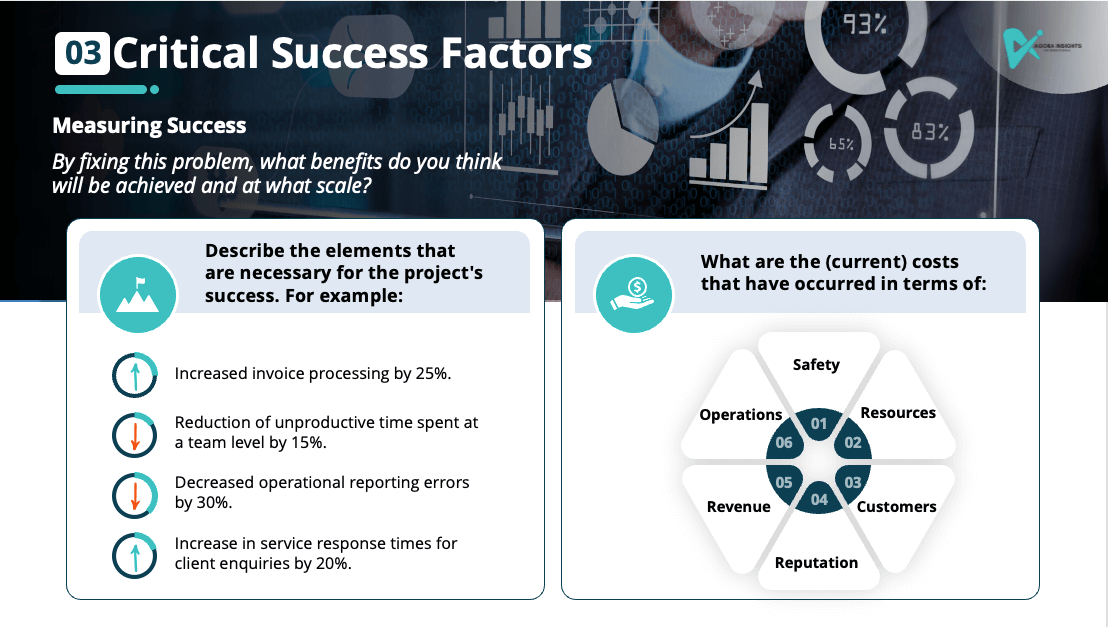Getting Critical Success Factors (CSFs) Right
A company's performance is determined by the quality of its decisions, especially during times of change. When initiating change, project management success and project success are not synonymous. This is because project management success has traditionally been measured in terms of time, cost, and quality. To truly understand the long-term success of our project/initiative, we must first understand the critical success factors of the business. Understanding our critical success factors allows us to create and align a set of high-level business requirements, increasing the chances of a project's overall success. In this post, we will define critical success factors, distinguish between CSFs and project management success, and describe examples of critical success factors.
3.1 What are critical success factors?
A critical success factor (CSF) is a component or activity that is required to ensure the success of a business or organisation. While CSFs fall into broad target areas such as revenue, efficiency, etc., critical success factors are highly specific and individualised within industries and when conducting change. A useful approach in determining critical success factors is to consider what is essential to the organisation’s future and how that future can be attained. Much of the thinking and research will already be at your fingertips in the form of your problem statement, created in part 2 of The Knowledge Brief.
Dr. Constantine 'Dino' Kiritsis of StudySmart provided an excellent explanation of Critical Success Factors (CSF) and how they relate to Key Performance Indicators (KPIs). According to the critical success factors theory, companies should excel in only a few areas. For instance, every company should excel in revenue, operations, people, and customers. These few areas, however, are critical to business success. KPIs, in relation to critical success factors, help us measure success. This video defines Critical Success Factors and why it is critical for businesses to focus on what "really" matters in business. You can also find more information on The Balanced Scorecard here
3.2 What distinguishes CSFs from project management success factors
Overall, critical success factors should answer the question: By fixing [this problem], the following [success/benefits] will be achieved [at what measure]?
According to a study1, not all researchers agree on what constitutes a successful project. It is old and narrow-minded to evaluate a project's success or failure solely on time, cost, and quality criteria. For instance, if we were building a house, even if the builder met the criteria in terms of time, cost, and quality, it doesn't mean that you are happy with the outcome. They could be using quality paint, but it's not the colour you like, or the kitchen products are quality, but the flow doesn't work and you have to walk to a different room to get the pantry. In the same way, for a business, there are some critical success factors that matter, like customer satisfaction, reputation, revenue, and improved operations. So even if you did deliver in terms of time, cost, and quality, did it meet your critical success factors?
The ability to measure requirements is another important consideration in your critical success factors. It's difficult to see the value of a requirement meeting time, cost, and quality if it's not directly aligned with business goals and objectives, i.e., the critical success factors. Business analysts should collaborate with stakeholders to understand this distinction. Success in change initiatives is not the same as success in project management. Although project management success is important, our critical success factors focus on change success, which is a longer-term solution than the project itself.
3.3 Examples of critical success factors

When thinking about how to establish critical success factors, it is helpful to look at a few examples
- Increased invoice processing + (KPI) by 25% = Business Requirement
- Reduction of unproductive time spent + (KPI) at a team level by 15% = Business Requirement
- Decreased operational reporting errors + (KPI) by 30% = Business Requirement
- Increase in service response times + (KPI) for client enquiries by 20% = Business Requirement
Effective vs. ineffective critical success factors
What’s important to note about these examples is that they are all specific and measurable. In order for a critical success factor to be meaningful, it has to be adequately defined and grounded in data. Take the first example of ;increased invoice processing by 25%”. By naming a percentage value, you create the specific target to aim for. If you achieve the 25% increase, you know you’ve nailed your target. If you reach 20%, you know you’ve come close but not quite hit the mark. If you see a 0% increase, you know you’ve missed by a mile
Now consider if you had set your critical success factor in a much more general way by aiming for ;better invoice processing.; A hazy goal like this doesn’t set a clear target, so if you achieve a 10% increase in invoice processing, you don’t know if you’ve knocked it out of the park, fallen just short, or failed miserably.
The difference between CSFs and KPIs
Critical success factors (CSFs) and key performance indicators (KPIs) can both help a business succeed. While CSFs are actions taken by a company to achieve its goals, KPIs are metrics that show the company's progress. Outlining and optimising a company's CSFs and KPIs can help it perform well and increase profits.
Key Learnings
- A company's performance is determined by the quality of its decisions, especially during times of change.
- When initiating change, project management success and project success are not synonymous.
- To truly understand the long-term success of our project/initiative, we must first understand the critical success factors of the business.
- A critical success factor (CSF) is a component or activity that is required to ensure the success of a business or organisation.
- According to the critical success factors theory, companies should excel in only a few areas.
- KPIs, in relation to critical success factors, help us measure success.
- Overall, critical success factors should answer the question: By "fixing" [this problem], the following [success/benefits] will be achieved [at what measure]?
- It is old and narrow-minded to evaluate a project's success or failure solely on time, cost, and quality criteria.
- The ability to measure requirements is another important consideration in your critical success factors.
- It's difficult to see the value of a requirement meeting time, cost, and quality if it's not directly aligned with business goals and objectives, i.e., the critical success factors.
- When thinking about how to establish critical success factors, it is helpful to look at a few examples
- In order for a critical success factor to be meaningful, it has to be adequately defined and grounded in data.
Summary
The quality of decisions made determines a company's performance. These, in turn, are dependent on the quality of information available to decision-makers. CSFs along with KPIs help business articulate what the specific goals are for a project to succeed. While CSFs are actions taken by a company to achieve its goals, KPIs are metrics that show the business change progress. The business analyst works to align the project background, problem and critical success factors to ensure that the business requirements are directly aligned to the what the business is wanting to achieve.
Stay tuned for our next blog post in "The Knowledge Brief ” series, in which we will focus on Root Cause Analysis.
References:
- Gem Consulting https://www.youtube.com/user/gemglobal/about
© The Knowledge Brief is a product of Agora Insights Ltd. All rights are reserved.
Post sponsored by Agora Insights Ltd


Post a Comment